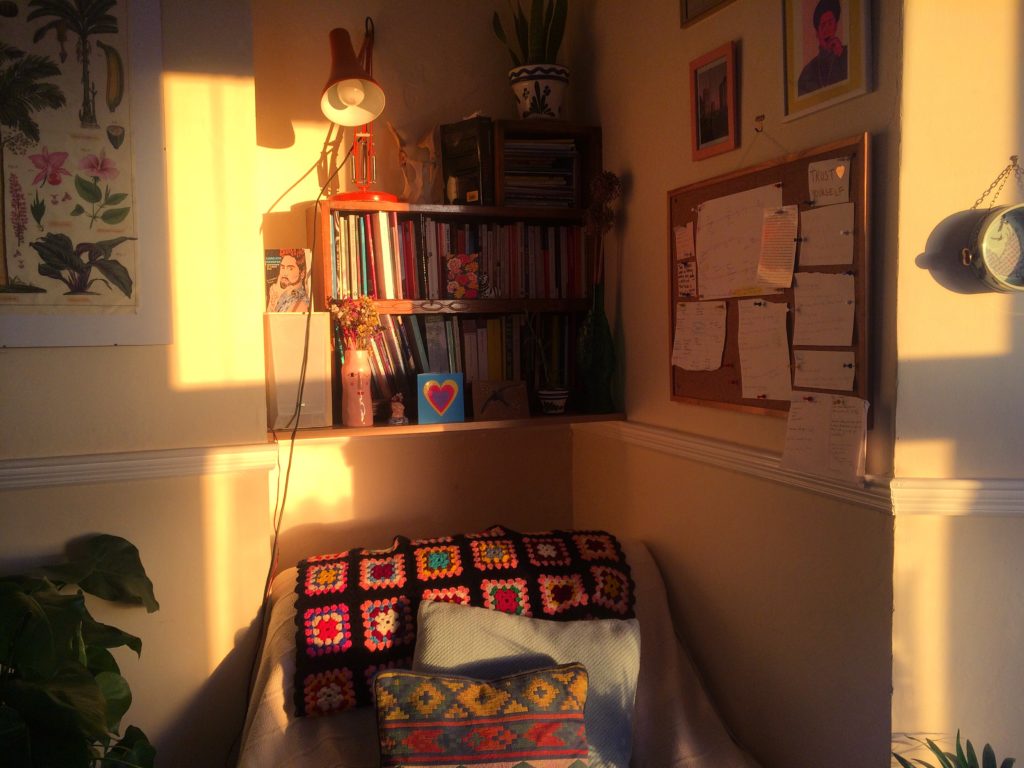It’s time for the annual end-of-year musings known in these parts as Shadows and Reflections. Since so many of our lives were lived in thematic overlap this year, we’ve asked our contributors and friends to focus on the small, strange and specific as they look back over the last 12 months. Today it’s the turn of Jessica Andrews.

Some things I have learned about writing this year:
I spent most of 2020 trying to write my second novel. Writing a second book is hard. My first book was a teetering risk, a tingling dare, a scream in the dark. I had no money, no real place to live, no map, no solid idea of what I was doing. But I knew how to listen to myself. I let the words come, without fear or judgement. There was light and death and anger curled around the letters and I opened my palm and set them free.
This year has been different. My first novel was based on my life and to read appraisals of something so close to me, in glossy print and pixels, drew me into a strange self-consciousness, like looking at myself from the outside. I was on a plane taking flight, looking out of the window and seeing myself left behind on the grey tarmac. My second book is different because now I am further away from that self and because it holds a tight coil of fears that feel closer to the person I am now.
Writing my first book freed me from many things, but when I sat down to write, I had already worked most of those things out and I just had to give them form. My first book was an answer that entangled me in new questions. It showed me a sticky clot of problems that I couldn’t see before. Writing my second book is a work of unravelling those problems, which writing always is, but these particular questions feel closer; cloying and dense.
Writing my first book changed my life. I have some money now. I have time. I no longer work in a bar for minimum wage. People listened to my ideas and recognised their own experiences in mine, which made me feel less alone. I published a novel, I fell in love, I moved to Spain and then back again. I honed my ideas into essays, articles and interviews. I worked out exactly what it was that I wanted to say. I made myself vulnerable. I ate octopus. I lived by the sea. Those kinds of things change a person. I am different now and so the way I look at the world has altered. The words I needed then are not the words that I need now. I have been sifting through the darkness, catching nouns and adjectives like emeralds and rubies, trying to find the words my characters are looking for.
I teach English to students in China and they keep confusing their adjectives, adverbs and nouns. ‘The girl was hungrily,’ they write. ‘The sky is noise.’ They mix up their tenses until I cannot figure out where in time and space we are supposed to be. ‘Are we in the past?’ I write in the margins. ‘Or are we in the future? You need to make it clear.’
Writing from your own life involves living in the past, present and future simultaneously. I write about my past self, for my past self, so she can see that the things she swallowed were not always her fault. I write to capture what it feels like to inhabit my body in the present moment because that feels urgent, although I cannot always articulate why. Writing is always about the future; a projection of hope and an attempt to leave a trace. My past feels impossibly far away, yet uncomfortably close. Writing my second book means looking back at myself, from a point in the future I have only just reached.
My characters are always looking for a home. I found my first real, adult home towards the end of this year and I didn’t realise how much my most recent protagonist needed a home until I learned how it feels to inhabit one. You need a home to be able to write; not necessarily a physical space, but a point of safety that you can look back from, a place that can hold all of the dark things you might find. After sleeping in living rooms, attics, co-ops, warehouses, churches and conservatories across Europe, I am finally renting a flat with a person I love, closer to my family. Closing the door for the first time felt as though I had been holding my breath for many years and I could finally begin to breathe out. There were words caught on that breath; new nouns and verbs and adjectives, a different way of looking at the world. I spat them out into the sink and I am watching them carefully, tending them and letting them grow. I am remembering how to listen to the dark thrum of my blood and it is different to the rhythm I heard before.
I thought that writing a second book meant I had to return to myself, but I am learning that isn’t true. I left my teenage self behind on the tarmac. I opened my palm and set her free. But there is another girl, struggling to be heard inside of me. It is not a return but an opening, a listening, trying to work out what she needs. I am spinning my sentences into a rope for her to hold onto, so she can climb up into the light.
*
Jessica Andrews writes about fragility, language, social class and the body, and her debut novel, ‘Saltwater’, won this year’s Portico Prize. You can follow her on Twitter here.